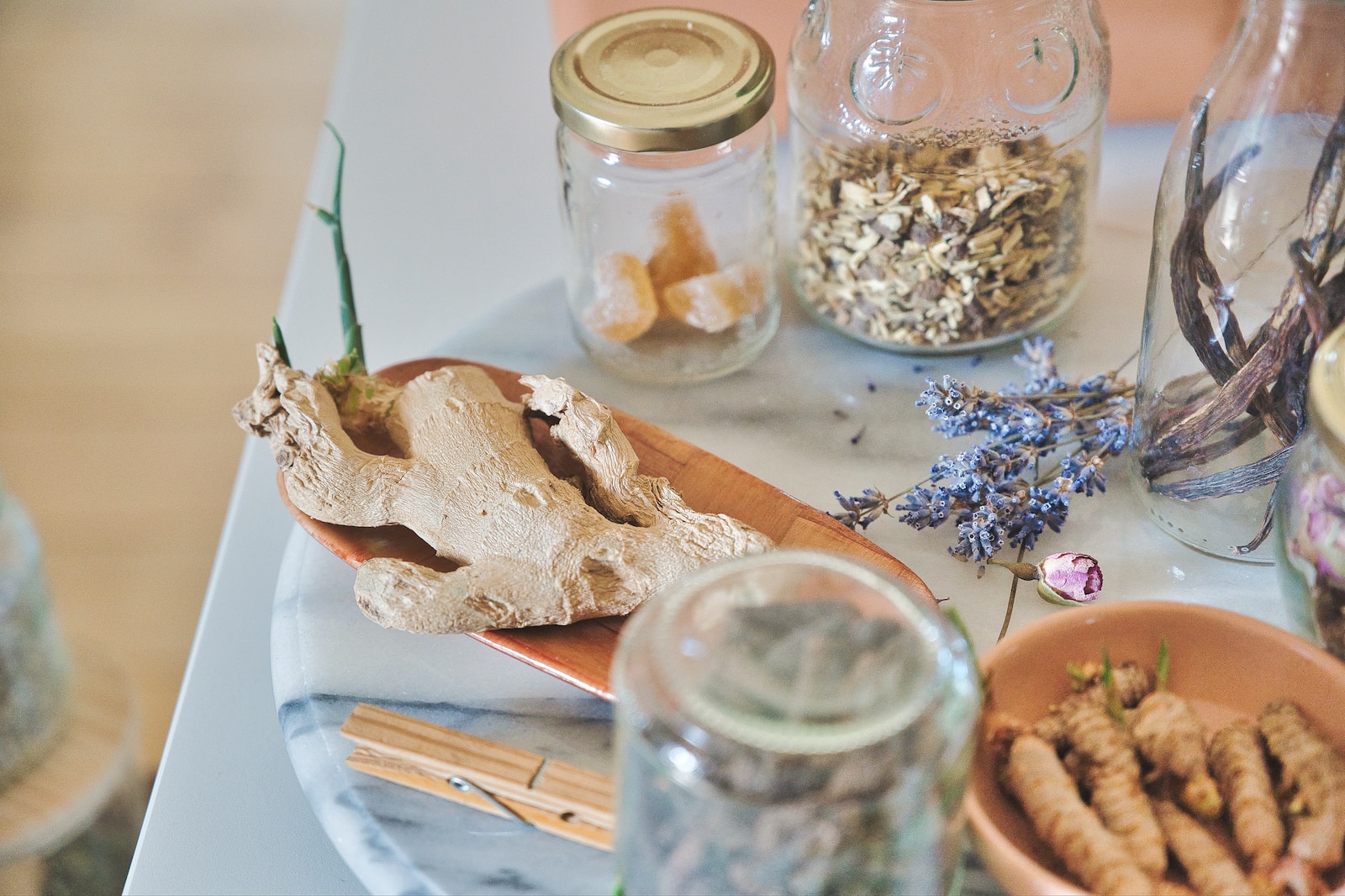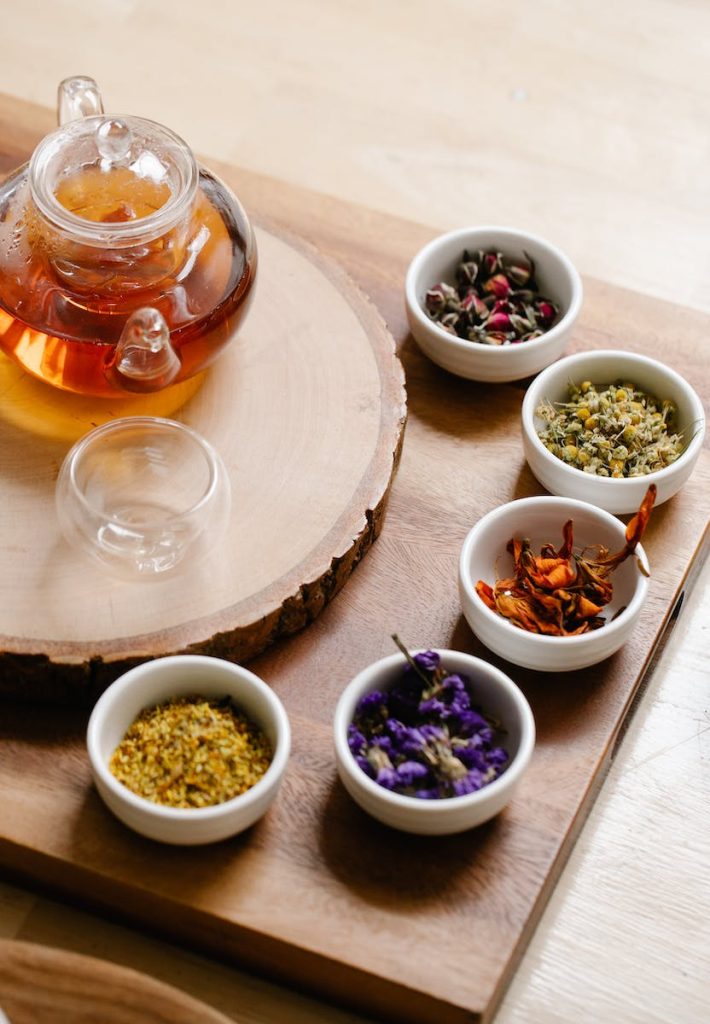Unlock Inner Peace: The Definitive Guide to Herbal Stress & Anxiety Relief
Did you know that over forty million adults in the United States suffer from anxiety disorders? If you’re one of them, this ultimate guide is here to help you find herbal relief from stress and anxiety.
Discover the power of natural remedies and learn how to identify the root causes of your stress. From calming herbs to nurturing your nervous system, explore holistic approaches to managing your well-being. Take control of your stress and anxiety with the healing properties of herbs.
Key Takeaways
- Over 40 million adults in the United States suffer from anxiety disorders.
- Herbal remedies offer a natural alternative to prescription medications for relieving stress and anxiety.
- Commonly used herbs for stress and anxiety include chamomile, lavender, lemon balm, and passionflower.
- Identifying personal triggers and tailoring coping strategies to individual needs is essential for finding herbal relief.
Understanding Stress and Anxiety
To better manage stress and anxiety, you need to understand the root causes and triggers of these emotions.
Understanding stress management and coping with anxiety is crucial for taking control of your mental well-being.
Stress can stem from various sources, such as work pressure, relationship issues, financial concerns, or even traumatic events. Identifying these triggers can help you develop effective strategies to minimize their impact on your life.
One key aspect of understanding stress management is recognizing the signs and symptoms of stress.
These can manifest physically, mentally, and emotionally.
Common physical symptoms include headaches, muscle tension, and sleep disturbances.
Mentally, stress may result in racing thoughts, difficulty concentrating, or memory problems. Emotionally, stress can lead to irritability, mood swings, or feelings of overwhelm.
By becoming aware of these indicators, you can take proactive steps to address stress before it escalates.
Another vital aspect of coping with anxiety is learning healthy coping mechanisms.
These can include engaging in regular exercise, practicing relaxation techniques like deep breathing or meditation, maintaining a balanced diet, and getting enough sleep.
Additionally, seeking support from loved ones, joining support groups, or seeking professional help can provide valuable guidance and assistance in managing anxiety.
The Power of Herbal Remedies
Discover the incredible power of herbal remedies in relieving stress and anxiety.
These natural solutions offer an integrated approach to promoting calmness and well-being.
Learn about the efficacy of herbs and how they can empower you to take control of your mental health and find inner peace.
Natural Stress Relief
If you’re looking for natural stress relief, herbal remedies can be a powerful solution.
Taking an integrated approach to managing stress and anxiety can provide long-term benefits for your overall well-being. Herbal remedies offer a natural alternative to prescription medications, and they can help reduce stress and promote relaxation.
Some popular herbal remedies for stress relief include chamomile, lavender, and lemon balm.
These herbs have been used for centuries for their calming properties and can be brewed into teas or taken in supplement form. Additionally, adaptogenic herbs like ashwagandha and rhodiola can help your body adapt to stress and restore balance.
Incorporating herbal remedies into your self-care routine can empower you to take control of your stress levels and find natural relief.
Efficacy of Herbs
When using herbal remedies for stress and anxiety, it is important to understand the efficacy of these herbs to make informed decisions about your self-care routine.
Herbal remedies can be effective in relieving stress and anxiety symptoms, but it’s essential to note that their efficacy may vary from person to person. Some commonly used herbs for stress and anxiety include chamomile, lavender, lemon balm, and passionflower.
These herbs have been shown to have calming effects and promote relaxation. However, it’s crucial to be aware of potential side effects, such as allergic reactions or interactions with other medications.
It is recommended to consult with a healthcare professional before incorporating herbal remedies into your stress and anxiety management plan to ensure their efficacy and safety for your specific needs.
Identifying the Root Causes of Stress and Anxiety
Uncovering the underlying triggers of stress and anxiety can be an essential step toward finding herbal relief. Identifying these triggers allows you to address the root causes, empowering you to develop effective coping strategies.
By understanding what triggers your stress and anxiety, you can take proactive steps to avoid or manage these triggers, leading to a more balanced and peaceful life.
To help you identify the root causes of your stress and anxiety, here is a table that outlines common triggers:
| Triggers | Physical | Emotional | Environmental |
|---|---|---|---|
| Work | ✓ | ✓ | |
| Relationships | ✓ | ||
| Financial | ✓ | ||
| Health | ✓ | ✓ |
By recognizing the triggers that affect you the most, you can start developing coping strategies tailored to your specific needs.
For example, if work is a major trigger, you can try incorporating stress-reducing techniques such as deep breathing exercises or herbal remedies like chamomile tea.
If relationships are causing stress, you may benefit from engaging in open communication or seeking support from a therapist.
Calming Herbs for Relaxation
To achieve relaxation, try incorporating calming herbs into your routine.
Calming herbs have been used for centuries to promote relaxation, reduce anxiety, and improve sleep.
If you find yourself struggling to unwind at the end of the day or experiencing trouble falling asleep, these herbal remedies for stress management may provide the relief you seek.
One popular calming herb for sleep is chamomile.
Chamomile tea is known for its soothing properties and can help relax your mind and body before bedtime. Another herb to consider is lavender, which has a calming aroma that can promote relaxation and improve sleep quality.
If you prefer a more traditional herbal remedy, valerian root may be worth exploring.
Valerian root has been used for centuries as a natural sleep aid and is known for its sedative properties. It can help calm your nervous system and promote a restful night’s sleep.
Incorporating these calming herbs into your routine can be as simple as enjoying a cup of herbal tea before bed or using essential oils with a diffuser.
By nurturing your nervous system with natural remedies, you can find relief from stress and anxiety, allowing you to achieve a state of deep relaxation and restful sleep.
Nurturing Your Nervous System with Natural Remedies
By incorporating natural remedies into your routine, you can nurture your nervous system and find relief from stress and anxiety.
Your nervous system plays a crucial role in regulating your body’s response to stress, so it’s important to support it with herbal remedies that promote relaxation and balance.
One effective herbal remedy for nervous system support is chamomile.
This gentle herb has been used for centuries to calm the mind and soothe the nervous system. You can enjoy chamomile tea before bed to promote a restful night’s sleep and reduce anxiety.
Another powerful herb for nervous system support is ashwagandha.
This adaptogenic herb helps your body adapt to stress and supports healthy cortisol levels.
By taking ashwagandha supplements regularly, you can help your nervous system better cope with daily stressors.
Lemon balm is another herbal remedy that can provide relief from anxiety.
This herb has been used for centuries to calm the mind and promote relaxation. You can drink lemon balm tea or take it in supplement form to support your nervous system.
Incorporating these herbal remedies into your routine can help nurture your nervous system and provide natural relief from stress and anxiety.
Remember to consult with a healthcare professional before starting any new herbal remedies to ensure they are safe and appropriate for you.
Herbal Teas and Infusions for Stress Relief
Try incorporating herbal teas and infusions into your routine for natural relief from stress and anxiety.
Herbal remedies have been used for centuries to promote relaxation and calmness. Here are two sub-lists to help you enjoy the benefits of herbal teas and infusions for stress relief:
Herbal Remedies for Sleep:
- Chamomile: Known for its soothing properties, chamomile tea can help relax your mind and prepare your body for a restful sleep.
- Valerian: Valerian root tea is known for its sedative effects, promoting a deeper and more restorative sleep.
Herbal Remedies for Digestion:
- Peppermint: Peppermint tea can help soothe an upset stomach and relieve indigestion, making it a great option for stress-related digestive issues.
- Ginger: Ginger tea aids digestion by reducing inflammation in the gut and calming the digestive system, which can be beneficial during times of stress.
Essential Oils for Instant Relaxation
Looking for instant relaxation? Aromatherapy with essential oils can be your go-to solution.
These oils are known for their calming scents that can help you unwind and de-stress.
So, why not try incorporating essential oils into your daily routine for instant relaxation and relief from stress and anxiety?
Aromatherapy for Stress Relief
To achieve instant relaxation, incorporate a few drops of essential oils into your aromatherapy routine.
Aromatherapy benefits your mind, body, and spirit by using essential oils extracted from plants that promote relaxation and reduce stress.
Here are two sub-lists to help you enjoy the benefits of aromatherapy:
- Popular Essential Oils for Stress Relief:
- Lavender: Known for its calming properties and ability to promote better sleep.
- Bergamot: Helps reduce anxiety and improve mood.
- Chamomile: Soothes nerves and aids in relaxation.
- Ylang Ylang: Creates a sense of peace and tranquility.
- Frankincense: Eases tension and promotes a sense of calm.
- Methods of Using Essential Oils:
- Diffusion: Add a few drops to a diffuser or a bowl of hot water to spread the scent throughout the room.
- Inhalation: Place a drop or two on a tissue or your palms and inhale deeply.
- Massage: Dilute essential oils with a carrier oil and gently massage onto your skin.
Calming Scents for Relaxation
To experience instant relaxation, incorporate calming scents such as essential oils into your daily routine.
Aromatherapy, the practice of using essential oils to promote well-being, has been used for centuries to alleviate stress and anxiety.
These natural remedies have numerous benefits, including improving sleep quality and reducing feelings of tension.
By harnessing the power of scent, you can create a calming environment that promotes relaxation and tranquility.
Here are some popular essential oils known for their calming properties:
| Essential Oil | Benefits |
|---|---|
| Lavender | Promotes relaxation and better sleep |
| Chamomile | Soothes the mind and helps alleviate anxiety |
| Bergamot | Eases stress and enhances mood |
| Ylang Ylang | Helps reduce stress and promotes a sense of calm |
Incorporating these essential oils into your daily routine, whether through diffusers, bath products, or massage oils, can provide a natural and integrated approach to relaxation.
By utilizing the power of calming scents, you can create a peaceful sanctuary in the comfort of your own home.
Now, let’s explore how you can further enhance your well-being by incorporating herbal supplements into your daily routine.
Incorporating Herbal Supplements into Your Daily Routine
Start incorporating herbal supplements into your daily routine for natural relief from stress and anxiety.
Herbal supplements are a wonderful way to support your overall well-being and promote a sense of calm and peace. Here are some ways you can incorporate these supplements into your daily life:
- Take them in the morning: Start your day off right by incorporating herbal supplements into your morning routine. This can help set a positive and calming tone for the rest of the day.
- Pair them with mindfulness practices: Incorporating mindfulness into your daily routine can enhance the effects of herbal supplements. Practice deep breathing, meditation, or yoga while taking your supplements to fully embrace their benefits.
- Create herbal bath rituals: Transform your evening bath into a soothing and therapeutic experience by adding herbal supplements to the water. Not only will this help you relax, but it will also allow the herbal properties to be absorbed through your skin.
Creating a Holistic Approach to Managing Stress and Anxiety
Take a comprehensive approach by incorporating various techniques to effectively manage your stress and anxiety.
Managing stress and anxiety goes beyond just taking herbal supplements.
It involves adopting a holistic lifestyle and utilizing mindfulness techniques to bring balance and peace to your mind, body, and spirit.
One important aspect of an integrated approach is to focus on self-care.
This means prioritizing activities that promote relaxation and rejuvenation.
Engaging in regular exercise, practicing yoga or meditation, and spending time in nature can all contribute to reducing stress and anxiety levels.
Mindfulness techniques are another powerful tool in managing stress and anxiety.
Mindfulness involves being fully present in the moment, without judgment.
It helps you observe your thoughts and emotions without getting caught up in them. This practice can help you develop a greater sense of calm and perspective.
Incorporating daily mindfulness exercises, such as deep breathing exercises or guided imagery, can be beneficial.
These exercises help activate the body’s relaxation response and reduce the stress hormone cortisol.
Frequently Asked Questions
What Are Some Common Symptoms of Stress and Anxiety?
Feeling overwhelmed by stress and anxiety is a common experience for many. It’s important to understand the symptoms associated with these conditions in order to effectively manage them.
Some common symptoms include irritability, restlessness, difficulty concentrating, and feeling on edge. However, there are alternative methods for relieving stress and anxiety besides herbal remedies.
By adopting healthy lifestyle habits, practicing relaxation techniques, and seeking support from loved ones, you can effectively manage stress and anxiety naturally.
Are There Any Potential Side Effects of Using Herbal Remedies for Stress and Anxiety?
When using herbal remedies for stress and anxiety, it’s important to be aware of potential side effects.
Different herbs can have different effects on the body, and while some may be effective for specific types of stress or anxiety, they may also come with their own set of risks.
It’s always best to consult with a healthcare professional or herbalist to ensure you are using the right herbs for your specific needs and to minimize any potential side effects.
How Long Does It Typically Take for Herbal Remedies to Start Working?
When it comes to herbal remedies for stress and anxiety, you might be wondering how long it takes for them to start working. Incorporating herbal remedies into your daily routine can be a fantastic way to manage stress and anxiety.
They offer an integrated approach that can complement other forms of treatment. By taking herbal remedies consistently and following recommended dosages, you may start to experience their benefits within a few weeks.
Remember, everyone’s body is different, so it’s important to be patient and listen to your body’s response.
Can I Use Herbal Remedies Alongside Prescription Medications for Stress and Anxiety?
Using herbal remedies alongside prescription medications for stress and anxiety can be a viable option.
It’s important to explore the potential interactions between the two.
While herbal remedies are often viewed as a more comprehensive approach, prescription medications can have a more immediate and targeted effect.
It’s best to consult with a healthcare professional who can provide personalized guidance based on your specific needs.
Ultimately, finding what works best for you and combining different approaches may be the most effective way to manage stress and anxiety.
Are There Any Specific Herbal Remedies That Are More Effective for Certain Types of Stress or Anxiety?
Are there any specific herbal remedies that work better for certain types of stress or anxiety?
Well, just like how different teas suit different moods, herbal remedies can also target specific stressors. Some herbs, like chamomile, can soothe general anxiety, while others, like lavender, are great for calming nerves before bed.
Holy basil is known for its ability to combat stress-related fatigue, while passionflower can help with restlessness.
So, finding the right herbal remedy for your specific type of stress or anxiety is like finding the perfect tea blend for your taste buds.
Elizabeth Redd: I am a passionate advocate for Health and Healing, dedicated to empowering individuals to live their best lives.
As the founder and publisher of Health and Healing, I have established myself as a guiding force in the wellness industry.
I am committed to providing the latest research, holistic approaches, and inspiring stories to open new possibilities for your health and healing journey.
Learn more about Elizabeth and Join Us at Health and Healing. Also, check out My About Page.






0 Comments